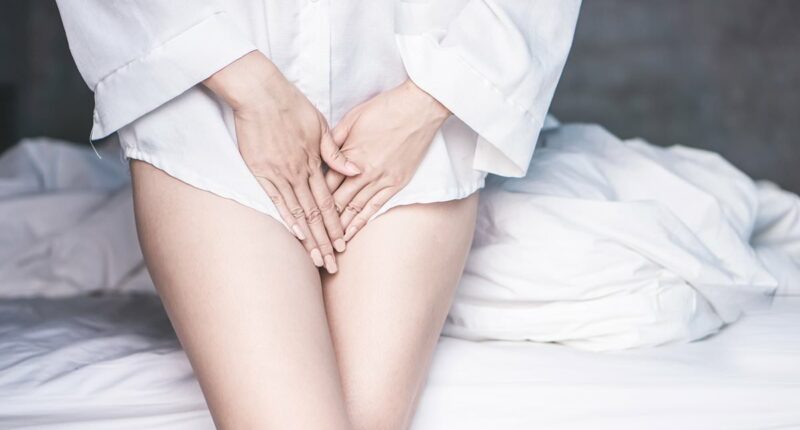Share this @internewscast.com
As Britain braces for a July ‘pollen bomb’ in the coming week – with sky-high levels of airborne allergens predicted to leave millions sneezing and streaming – an unexpected and rather delicate question arises: could a woman’s vagina suffer from hay fever, too?
It might sound improbable – even absurd. However, evidence suggests that the same pollen particles that trigger itchy eyes and runny noses can also cause irritation, itching, burning and swelling in the vaginal area.
‘The vagina has a mucosal surface similar to the nose or eyes – and can be affected by allergens circulating in the body, as well as by direct contact,’ explains Tania Adib, a consultant gynaecologist at The Lister Hospital in London.
This phenomenon – sometimes called allergic vaginitis – remains little discussed and often misdiagnosed. Yet researchers believe it is biologically plausible, and may be more common than commonly thought.
WHY POLLEN’S EFFECT MIGHT NOT STOP AT YOUR NOSE
The explanation for vaginal hay fever is straightforward: the delicate mucosal tissue in the vagina, as with the tissue in the nose, acts as a front line defender against pathogens. But it can also overreact to environmental allergens, such as pollen.
Inhaling pollen could, in rare cases, prime your immune system to mount an allergic response in more unexpected places.
There is also a potentially direct effect if the tissue of the vulva is exposed to pollen.
WHAT DOES THE SCIENCE SAY?
A 2022 review of studies, published in the journal Archives of Gynaecology and Obstetrics, highlighted a number of causes of ‘vulvovaginal’ allergic symptoms – itching, swelling and burning.

An estimated 13 million people in the UK suffer from hay fever

Allergic vaginitis remains little discussed and often misdiagnosed, with thrush usually considered more likely

Tania Adib, a consultant gynaecologist at The Lister Hospital in London, says ‘seasonal allergens may trigger vulvovaginal symptoms in sensitive women’
While sperm was the most common trigger for vaginal allergies, a surprising 44 per cent of affected women were allergic to pollen.
In most cases, this irritation came from direct contact with pollen on the skin of the vulva, but the authors noted symptoms could also arise simply from inhaling pollen, writing: ‘Allergens can sensitise the vaginal mucosa secondarily to other exposure routes, specifically aero-allergens.’
Other evidence for vaginal hay fever comes from a 2007 study published in the journal Obstetrics and Gynaecology Research, which found that if you suffer from other allergies or have a family history of allergies, your risk of vaginal symptoms may be higher.
A significant proportion of women with recurrent vulvovaginitis (RVV) – inflammation of the vulva and vagina, causing itching, burning, redness, swelling and discharge – where other causes such as thrush had been ruled out, also had allergic conditions such as hay fever, eczema and asthma; 31.4 per cent had allergies compared with just 6 per cent of healthy women used as a comparison group.
What’s more, the most common allergy was hay fever, which affected 45 per cent of the women with RVV.
Meanwhile, a study published in Archives of Gynaecology and Obstetrics in 2016 found that when women with allergies inhaled pollen (such as grass and ragweed pollen) were treated with immunotherapy to desensitise them to their allergen, their vaginal symptoms improved alongside their respiratory symptoms.
‘Seasonal allergens may trigger vulvovaginal symptoms in sensitive women,’ says Dr Adib.
‘A clue is if you suffer from recurrent irritation that coincides with peak pollen periods and other conditions, such as thrush, have been ruled out.’
IT’S OFTEN MISDIAGNOSED
Many women endure months – sometimes years – of uncomfortable symptoms and repeated thrush treatments, only to find no lasting relief. Why? It may be because allergic vaginitis is rarely considered.
‘Thrush can be over-diagnosed,’ warns Dr Adib. ‘If you find your symptoms flare every spring and summer, it’s worth asking your doctor about a possible allergic cause rather than assuming it’s always thrush.’
She adds: ‘While I don’t see this very often, some women who’ve been successfully treated for thrush still get itching.
‘When we give those patients an antihistamine, this tends to work well.
‘If you are prone to allergies generally, you could get vaginal symptoms. It’s not the first thing I’d consider, but if everything else has been ruled out, it’s something to think about.’
So, if July’s pollen bomb has you sneezing and shifting uncomfortably in your seat, it might not be in your head. Your vagina could, in fact, have hay fever.















